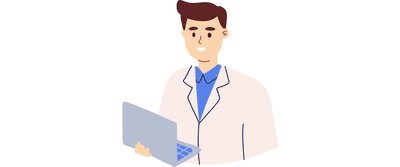![Healthy Matters]() Pharmacist Tips | Dosages | Side effects
Pharmacist Tips | Dosages | Side effects![Healthy Matters]() Nutritionist Tips | Facts | Precautions
Nutritionist Tips | Facts | Precautions![Healthy Matters]() Practitioner Tips | Dosages | Side effects
Practitioner Tips | Dosages | Side effects![Healthy Matters]()
![Healthy Matters]()

How Cognitive Behavioral Therapy (CBT) Can Treat Mental Illnesses
3 min read

One of the most famous psychological treatment approaches is cognitive behavioral therapy. According to the American Psychological Association, cognitive behavioral therapy is an effective intervention that can even improve daily functioning and quality of life. Here is a comprehensive guide of what cognitive behavioral therapy is, how this treatment approach works and more.
What is CBT?
Cognitive behavioral therapy (CBT) is a psychoeducational intervention that is used to treat mental illness. This therapeutic approach is typically used by mental health professionals to treat depression and anxiety. However, CBT is also applicable among clients with schizophrenia, eating disorders, and bipolar disorder.
In general, CBT intervention is designed based on Aaron Beck’s cognitive theory and the assumption that feelings are the results of cognition. CBT generally focuses on helping the client to identify negative thought patterns and to change dysfunctional thinking and maladaptive behavior.

Aaron Beck’s work on depression
The Negative Cognitive Triad
Beck (1979) proposed that our emotions are the result of our cognition, in other words, what we think will lead to what we feel. Based on this assumption, Beck proposed the negative cognitive triad model and suggested that major depressive disorder clients have a negative view of the self, the world and the future.

Automatic Thoughts
Apart from the negative triad, Beck (1979) also proposed that clients suffering from major depressive disorders usually possess automatic thoughts, also known as cognitive distortions. There are numerous automatic thoughts, all of which contribute to negative emotions. For example, people who have overgeneralization draw an unrealistic and broad conclusion from a tiny mistake (e.g. if I fail a test, I will die); while people who demonstrate personalization attribute uncontrollable negative consequences to themselves (e.g. My child cannot solve this mathematical problem, I must be a terrible parent.)
Here is a list of some common automatic thoughts:
- All-or-nothing thinking
- Catastrophizing
- Disqualifying the positive
- Emotional reasoning
- Magnification/minimization
- Mind reading
- Overgeneralization
- Personalization
- Blaming
- Jumping to conclusion
How does CBT work?
The primary goals of CBT are to change the thought patterns of the client and lead clients to understand that the negative emotions they are experiencing are mainly caused by their negative view of the world, the self and the future.
In order to change their negative thought pattern, CBT therapists will apply various tools to educate the client of the models. For example, clients in CBT interventions usually will receive take-home assignments and thought record forms, allowing them to realize their thought patterns. In addition to this, CBT therapists will also encourage clients to write a mood diary every day, allowing them to recognize and further reflect on their thought patterns and feelings.
Structure of a CBT session
The duration of CBT usually depends on the progress of the clients. Therefore, there is no fixed duration for a CBT. However, a standard CBT treatment length will be around 20 weeks. While a brief CBT usually lasts for approximately 10 to 12 weeks. Moreover, each CBT session usually lasts for approximately 30 to 60 minutes.
The structure of one CBT session typically consists of 1) reviewing take-home assignments, 2) setting new agenda, and 3) discussing new assignments. More specifically, the general flow of a CBT will be:
- Mood check
- Bridge from the previous session
- Review of homework
- Agenda-setting
- Discussion of new homework assignment
- Summary and feedback
What are the Pros and Cons of CBT
Pros of CBT
- Strong theoretical support
- Only a short time is required for the treatment
- CBT can be combined with biomedical treatment
Cons of CBT
- May not benefit clients with learning difficulties
- Since CBT encourages clients to complete take-home assignments, clients are required to demonstrate good reading and writing ability
- Present-oriented approach
- Failing to consider clients’ past experiences
- E.g. traumatic experience in childhood
Effectiveness of CBT
CBT is effective for a wide range of mental disorders. The following are some common examples of mental illness which can be benefited from CBT:
- Depression
- Anxiety
- Schizophrenia
- Eating disorders
- Bipolar disorder
- Phobias
- Post-traumatic stress disorder (PTSD)
A client may expect to receive take-home assignments from the therapists and reflect on how thought patterns may have contributed to the client's feelings. CBT is effective for all age groups, including children, adolescents, adults and the elderly. However, commitment and cooperativeness from patients are essential for the optimal outcome. Failing to complete an assignment on time may reduce the overall effectiveness of CBT. Consequently, it is essential to make sure that the client can commit to the therapy before attending the session.
Do you need help?
In case of need for immediate support, please do not hesitate to reach out for professional help. Below is a list of hotlines with 24-hour support.
Suicide prevention hotlines
Hotline: 2896 0000
Available language: English, Cantonese, Mandarin
Hotline: 2382 0000
Available language: Cantonese
The Samaritan Befrienders Hong Kong
Hotline: 2389 2222
Available language: Cantonese
This article was independently written by Healthy Matters. It is informative only and not intended to be a substitute for professional medical advice, diagnosis or treatment. It should not be relied upon for specific medical advice.

Your health resource, made in Hong Kong
Healthy Matters is Hong Kong’s leading health resource. Our mission is to help you make better health decisions and take control of your health.
Our team of experts is committed to producing reliable health content that is accurate, engaging and relevant, to cover your health & wellness journey from prevention to treatment.
Whether you are looking for trusted information on health conditions, wellbeing or looking for the right doctor or service in Hong Kong, we’re here to help!
Your health matters. Begin your health journey with Healthy Matters today!

































